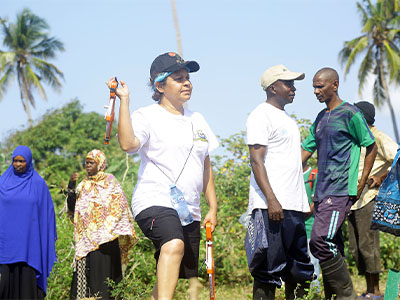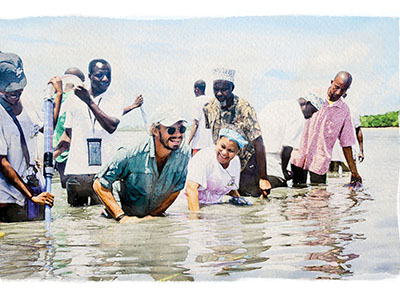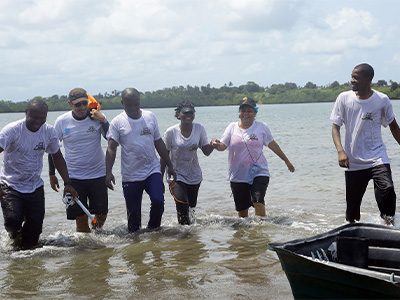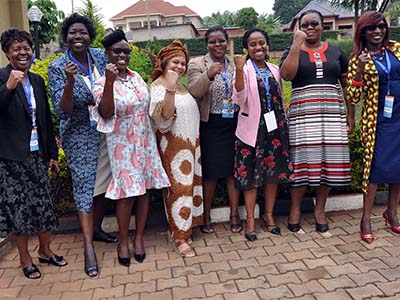Redefining Governance
Summer 2020 Issue
 Redefining Governance
Redefining Governance
By Judy Gelman Myers
In December 2019, Ana Menezes received a 100 Best Employees Award from the United Nations’s Food and Agriculture Organization (FAO). It was the FAO’s way of acknowledging her contribution to ending world hunger through effective management of commercial aquaculture. She currently works at FAO headquarters in Rome, Italy, supporting member states around the world in developing strategies and technological approaches to farming aquatic species in a sustainable and profitable manner.
 Ana Menezes works with sea cucumber farmers in Zanzibar.
Ana Menezes works with sea cucumber farmers in Zanzibar.
Menezes graduated from ESF in 2008 with a Ph.D. in environmental science, environmental and natural resources policy.
Writer Judy Gelman Myers recently spoke with Menezes about her views on sustainability and how her education at ESF trained her for her critical work at FAO.
ESF: You graduated from ESF in 2008 with a Ph.D. in environmental science and natural resources policy. Tell me about your studies.
AM: I had a very rich background before coming to ESF. I’d been an agriculture engineer, aquaculture researcher and national director of environmental planning in Mozambique, my home country, where I liaised between donors and governmental environment units.
Unhappy with the environmental degradation and socioeconomic disparities I was seeing in Mozambique, I started questioning what I was doing and applied for and won a Fulbright.
While I was preparing to leave Africa to come to ESF, I attended my friend’s birthday party, hosted by Nelson Mandela’s wife. Mandela became inquisitive about my work and where I saw myself in the future. I told him my reservations about how Mozambique was managing its financial and natural resources in the name of poverty eradication, and he told me I was mixing politics with policies. He advised me to focus on fisheries and aquaculture and expressed his wish that more women work with environmental models, as we are the safeguards of family food security, making us the best stewards of the environment.
Here in Syracuse, the head of ESF convinced me to do my Ph.D. in environmental sciences and natural resources management. The wonderful faculty at ESF and Maxwell School helped me understand that my questions were much bigger than fish, plants or the ecosystem specifically. I was looking at the full scope of sustainability, encompassing socioeconomics, the law, institutions and the environment.
For my own purposes, I summarized it in one word: governance. At that point I understood that my conversation with Mandela was about governance that put people at the center of the ecosystem, not preservation of the ecosystem per se, or fish per se.


ESF: Tell me about your work at FAO.
AM: For my first six years I was based in Ethiopia, as a fisheries and aquaculture officer.
My work ranged from policy drafting and advocacy to mass creation of sustainable farming of aquatic products. My approach was to create an ecosystem-based aquaculture or fishery with profit in mind.
It was very difficult to sell an ecosystem-based approach coupled with business, as they seem to contradict each other. The solution was to show how we could take care of the ecosystem in a way that fisherfolks and farmers could have money in their pockets.
I strove to weaponize people with as much knowledge as possible, teaching basic technical things such as why phytoplankton are important for healthy fish production, or more complicated topics such as finances.
I currently work at headquarters in Rome, for the Fisheries and Aquaculture Department. We develop policies and strategies for the sound development of aquaculture, and we provide technical support to member states worldwide. I do miss the field, though — that’s where you feel the flesh and blood and sense the pulse.
ESF: I imagine strategies and technical support vary according to the member state.
AM: You’re absolutely right. One size in governance doesn’t fit all. We have to consider the specificities and variables of each country and each environment.
Let’s suppose I’m working with Kenya, where there are two totally different environments — inland and marine. There are also different levels of aquaculture (commercial and noncommercial, integrated or monocrop). Finally, there’s the gender dimension. There are more women working with fish processing and marketing. How do you integrate them in a meaningful way as safeguards of the environment but also family buffers regarding food-nutrition security and carriers of cultural and family values?
ESF: What do you like best about your work at FAO?
AM: I love teaching fisherfolk and farmers how to transform whatever technique or system they’re using into one that’s less harmful and more efficient. At the same time, I also love working with policymakers and fisheries managers drafting and implementing programs.
People today don’t want answers, they need solutions. The technical expertise is out there. Any failure that occurs now is a failure of governance, of our living up to our promise to bring solutions.
Judy Gelman Myers is a freelance science writer based in New York City.